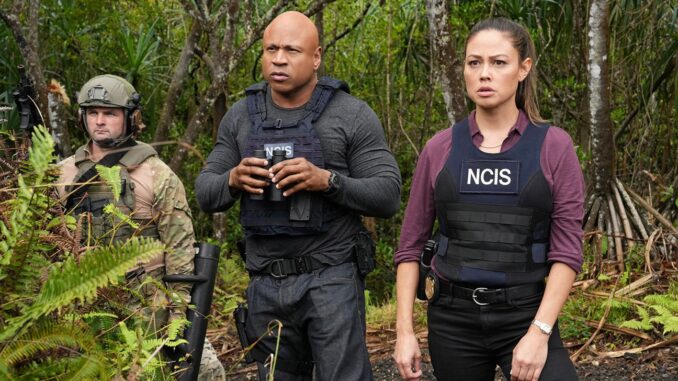
The cancelation of NCIS: Hawai’i is a massive loss for one important aspect of the NCIS franchise. The island-themed NCIS spinoff was on air for just three seasons, a short lifespan within a franchise that regularly launches spinoffs that last at least twice that long. While the decision leaves NCIS: Hawai’i characters like Jane Tennant with unfinished storylines, it is also a disappointing development for the franchise’s commitment to diversity.
NCIS: Hawai’i first aired on CBS in 2021, and it was the fourth spinoff in the NCIS franchise. Now that NCIS: Hawai’i is officially canceled and will not return for a fourth season, it’s the third spinoff to be canceled, joining NCIS: Los Angeles and NCIS: New Orleans in the list of spinoffs from the flagship NCIS that didn’t survive as long as the original. However, while these cancelations were disappointing, NCIS: Hawai’i has refreshing qualities that make its departure significantly worse.
When news broke that NCIS: Hawai’i was getting the axe, fans were stunned. But beyond the usual disappointment that comes with a favorite show ending, this cancellation cuts deeper—it’s a major loss for one of the franchise’s most groundbreaking elements: representation.
Let’s dive into what made NCIS: Hawai’i stand out, why its cancellation stings, and how it leaves a noticeable void in the long-running NCIS universe.
The Shockwave of Cancellation
CBS Pulled the Plug—But Why?
Despite solid ratings and a loyal fan base, CBS decided to cancel NCIS: Hawai’i after three seasons. The network cited shifting priorities and restructuring, but many fans aren’t buying it. This wasn’t just another show—it was a statement.
The Fan Reaction Was Instant and Intense
Social media erupted. Hashtags like #SaveNCISHawaii trended globally. Why? Because fans knew this series was more than procedural storytelling. It was about visibility, diversity, and cultural authenticity in ways rarely seen on network TV.
What Made NCIS: Hawai’i Different
The First Female Lead in NCIS History
Vanessa Lachey’s role as Special Agent Jane Tennant was historic. Never before had the NCIS franchise centered around a woman—let alone a woman of color—in a commanding lead role. That alone shattered glass ceilings.
Lachey’s Performance Was a Power Move
She wasn’t just playing a leader—she embodied one. Tennant juggled motherhood, command, and crisis with a grace that inspired fans, particularly women who rarely see themselves in such layered roles on primetime TV.
Representation That Went Beyond Surface Level
Authentic Island Culture
Filmed and set in Hawai’i, the show gave real space to Native Hawaiian voices and traditions. It wasn’t just palm trees and surfboards—it highlighted local customs, community struggles, and indigenous heritage with care.
Hawaiian Actors Had a Spotlight
Actors like Kian Talan and Alex Tarrant brought genuine depth, showcasing the lived experiences of Pacific Islanders. Their characters weren’t token add-ons—they were integral to the story.
Language, Food, and Values Got Screen Time
From ‘ohana spirit to Pidgin dialogue, the show wove local flavor into each episode. It didn’t water things down for a mainland audience—it celebrated authenticity.
LGBTQ+ Representation That Mattered
Breaking Ground with a Queer Relationship
Lucy’s relationship with Kate was one of the franchise’s first major LGBTQ+ pairings. And guess what? It wasn’t just a side plot—it was real, romantic, and central to the characters’ development.
Queer Love Without the Tragedy
Unlike so many shows that use LGBTQ+ relationships for drama or heartbreak, NCIS: Hawai’i allowed its queer characters to thrive, love, and live. It was refreshing—and sadly rare.
Diverse Casting Wasn’t Just a Gimmick
A True Melting Pot
The cast included Asian, Pacific Islander, Latino, and Black characters working together as equals. This diversity wasn’t forced; it felt natural, like the real world.
Behind the Camera Representation
The writers’ room and directing team included people of color, women, and voices from the LGBTQ+ community. That authenticity? It started in the script.
The Franchise’s Progressive Pulse
A Modern Vision for NCIS
While the flagship NCIS and its spin-offs (Los Angeles, New Orleans) often stuck to traditional formats, Hawai’i brought something new—a progressive heart.
Tackling Today’s Issues
From environmental justice to racial profiling, the series wasn’t afraid to take on tough, relevant topics, giving them the gravity they deserve.
How the Cancellation Sets the Franchise Back
Losing Ground on Inclusivity
Axing NCIS: Hawai’i sends a discouraging message. After years of asking for more representation, fans finally had a show that delivered. And now? It’s gone.
A Step Backwards, Not Forward
The franchise now feels less inclusive without Hawai’i. It’s like tearing out the boldest page of a well-worn book.
The Industry Still Has Work To Do
Diverse Shows Deserve More Than Three Seasons
Too often, shows that center around women, minorities, or LGBTQ+ characters get short runs. Networks need to stop treating diversity like a gamble—and start treating it like a priority.
Fan Voices Are Louder Than Ever
The backlash to this cancellation proves one thing: audiences want representation. They’re done accepting cookie-cutter casting and formulaic plots. They want bold, real, diverse stories.
The Legacy of NCIS: Hawai’i
It Broke New Ground
From casting to content, NCIS: Hawai’i dared to be different. That courage made it unforgettable.
It Inspired the Next Generation
Young women, especially girls of color, saw themselves in Jane Tennant. LGBTQ+ teens saw love that looked like theirs. Indigenous kids saw their culture on screen. That matters.

Hope Isn’t Lost Yet
Could a Revival Happen?
Given the massive support online, there’s a slim—but real—chance the show could find a new home. Streaming services have resurrected fan-favorite series before. Don’t count this one out.
The NCIS Universe Can Still Learn
Maybe Hawai’i’s cancellation is a wake-up call. The next NCIS spin-off—if there is one—should carry the torch that Hawai’i lit. And it better burn even brighter.
Conclusion
NCIS: Hawai’i wasn’t just another cop drama. It was a cultural milestone, a breath of fresh island air in a franchise often stuck in its ways. Its cancellation doesn’t just leave fans mourning a beloved cast—it strips the NCIS universe of its most progressive voice. Let’s hope the powers-that-be realize what they’ve lost… and what’s still worth fighting for.